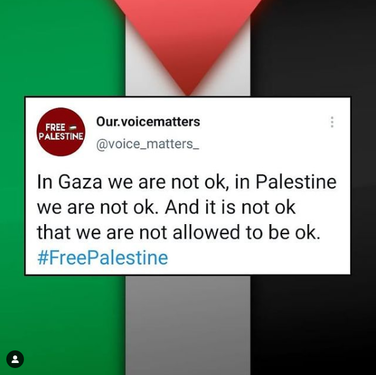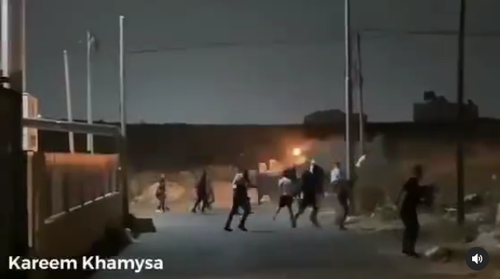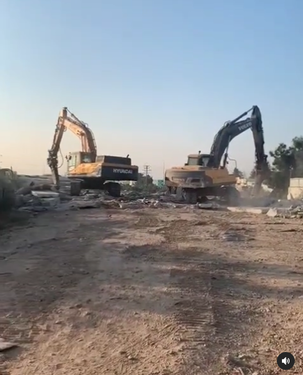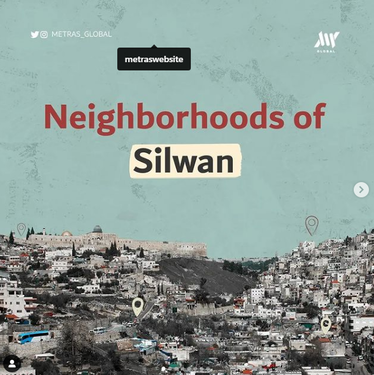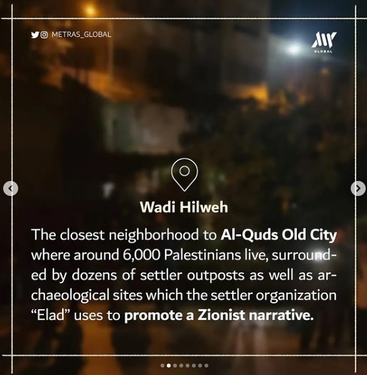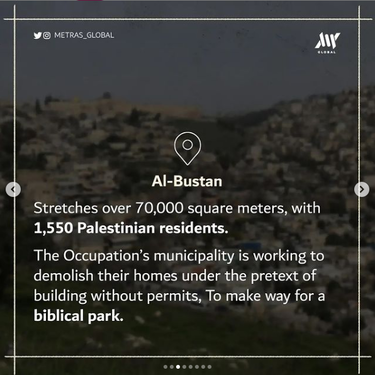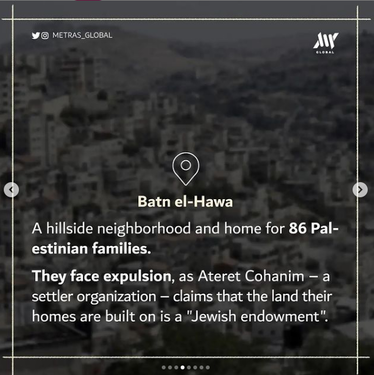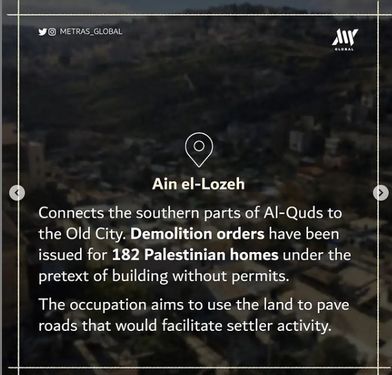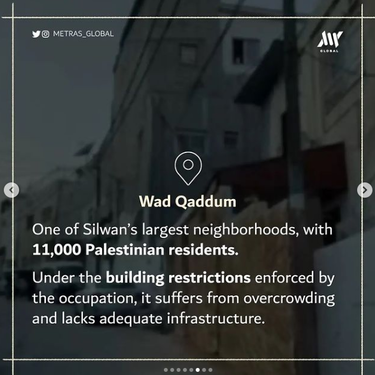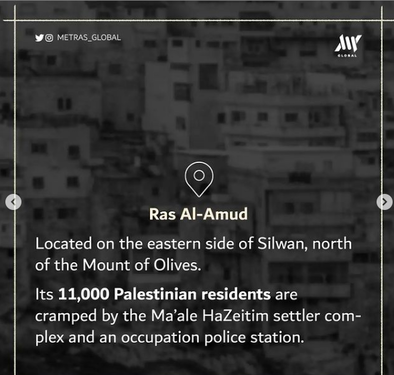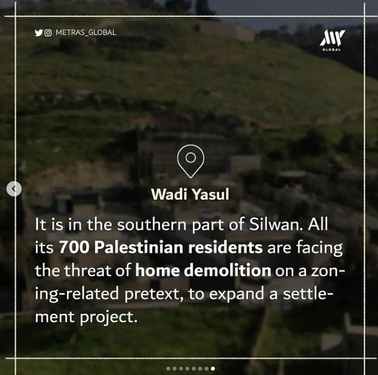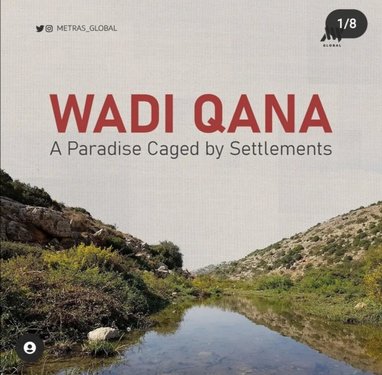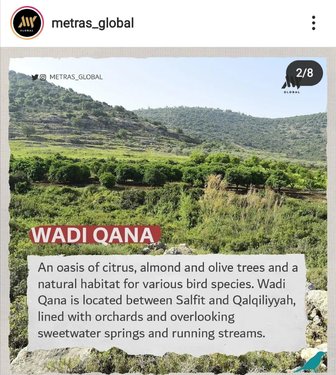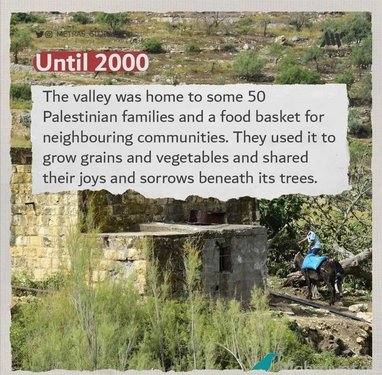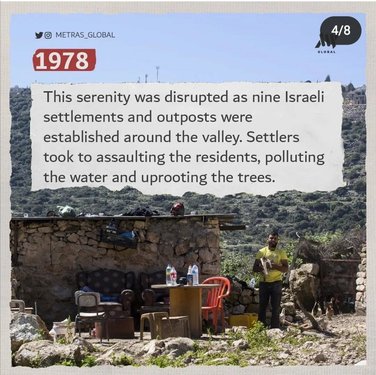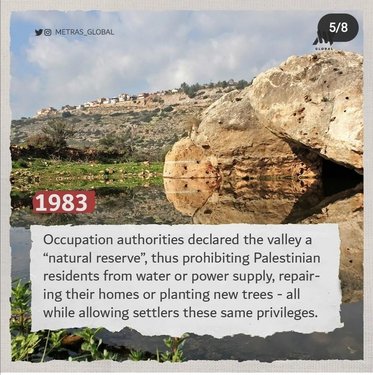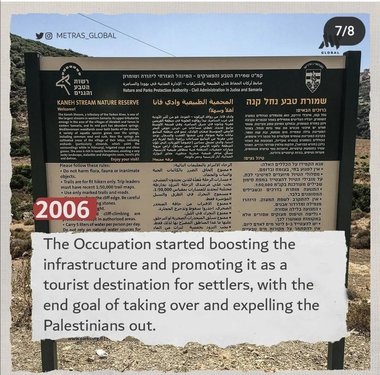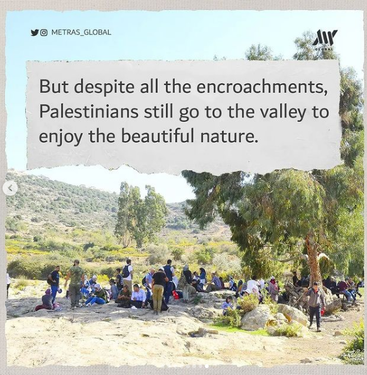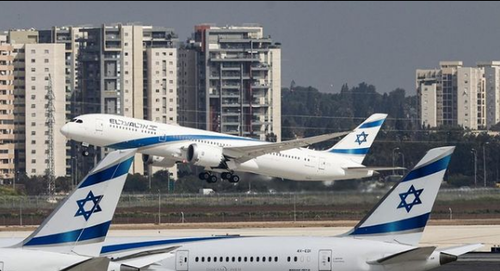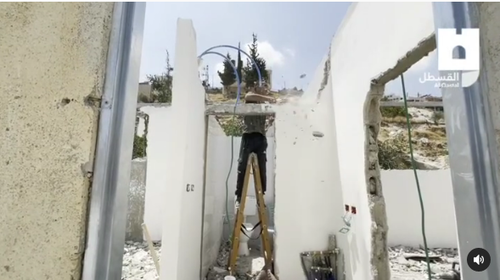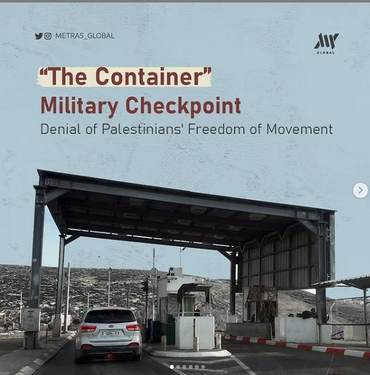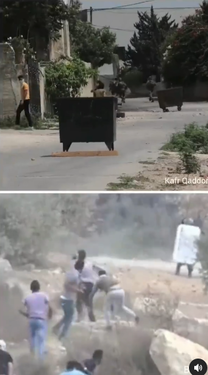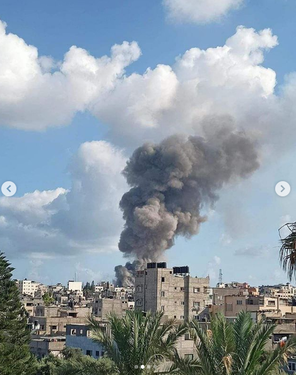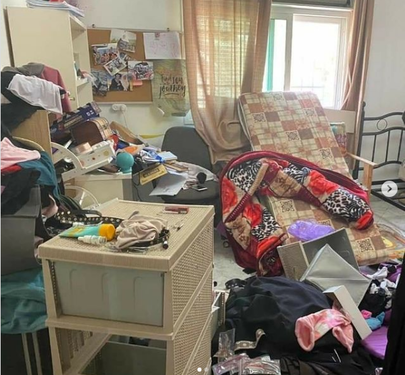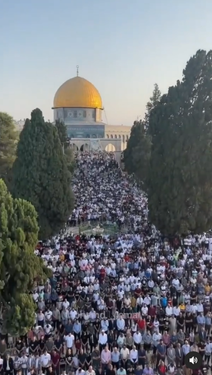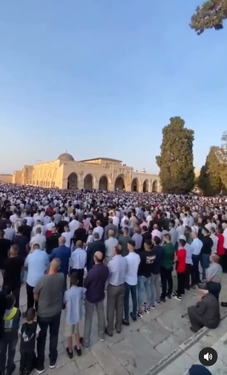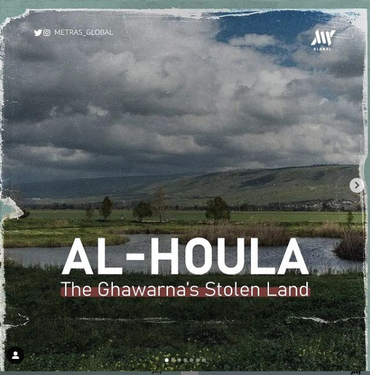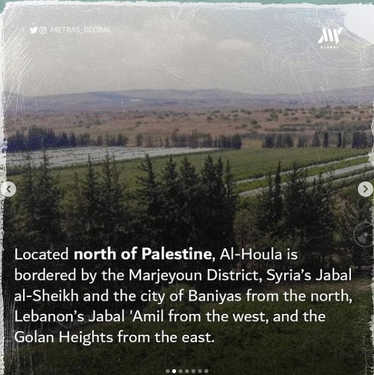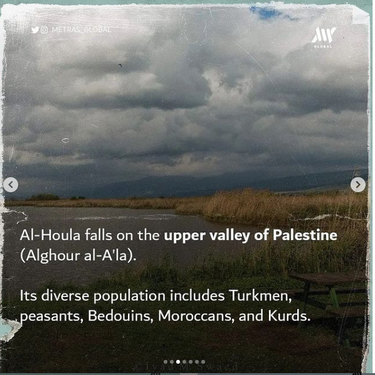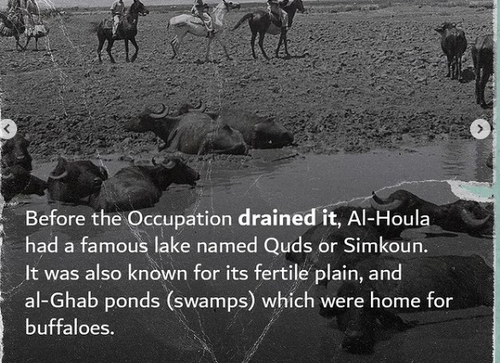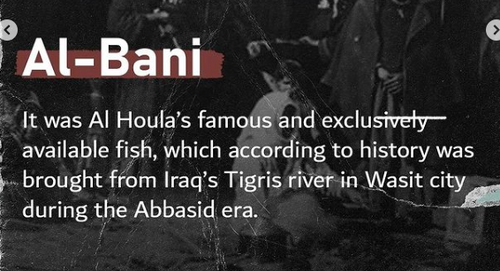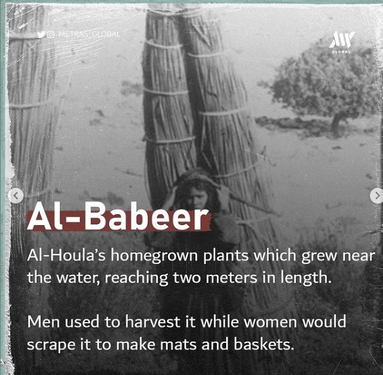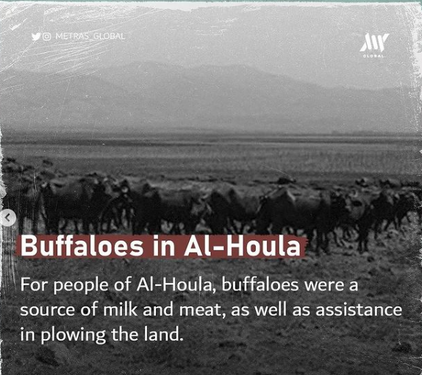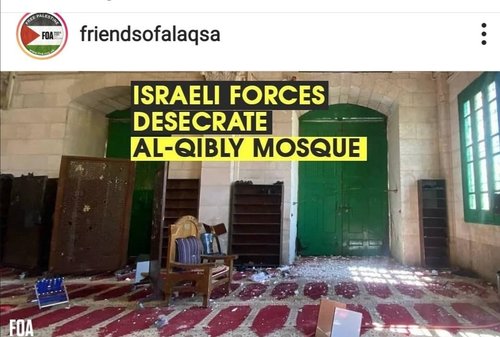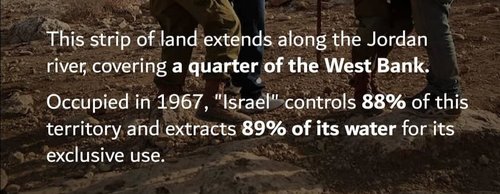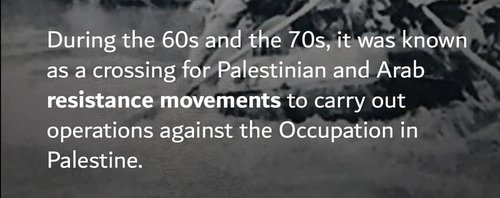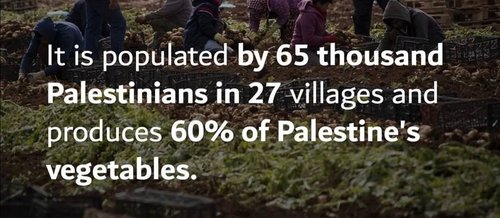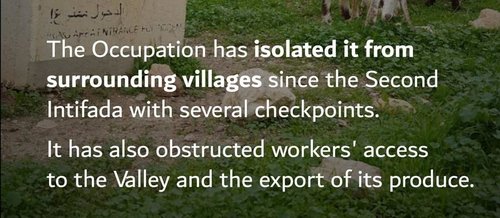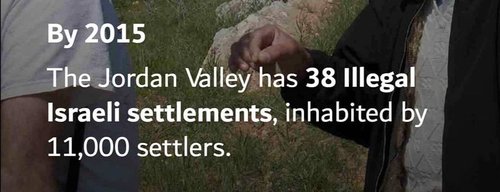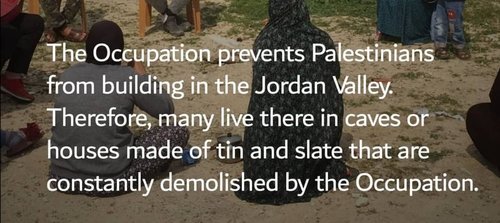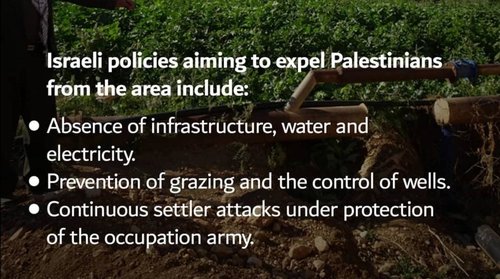-
Posts
8,434 -
Joined
-
Days Won
771
Content Type
Profiles
Forums
Events
Everything posted by ummtaalib
-
Remember this guy...? Yaakov Fauci the illegal settler from New York who lives in part of the Al-Kurd family home in Sheikh Jarrah neighbourhood? Fauci became notorious for publicly admitting his crime when he stated, “If I don’t steal it, someone else is gonna” New York justice advocates expose colonizer Fauci outside his home, demand end to government support for settlement funders Read here....
-
Mohammed El-Kurd The world has looked away, but in Sheikh Jarrah the effort to dispossess us has not slowed down A few months ago, the world’s attention was on Sheikh Jarrah, my neighbourhood in occupied Jerusalem. For decades, Israeli settlers, backed by their state, have been trying to displace us from our homes and colonise our neighbourhood. The UN called these forcible expulsions a war crime. I call this theft – because it is. https://i.guim.co.uk/img/media/bf3acc44d271f66c08bb394f5dc84b79ef6cc501/0_198_2867_1721/master/2867.jpg?width=460&quality=85&auto=format&fit=max&s=99c949bd8f9dafa5b3d528da6c8511b5 Palestinians protest for fifth day in West Bank after death of activist Read more In May, our efforts to resist this takeover received a surge of solidarity from Palestinians across Jerusalem and further afield, in what became known as the Unity Uprising. Palestinians were subjected to Israeli violence across the eastern part of Jerusalem – not only in Sheikh Jarrah, but outside the Damascus gate (itself a focus of protests), and in and around the al-Aqsa mosque – which escalated into attacks on besieged Gaza. Palestinians mobilised and resisted, and around the world people demonstrated in support of the Palestinian right to liberation and decolonisation. But after the ceasefire, the world’s attention has moved away. The reality for Palestinians, however, has not changed. Sheikh Jarrah, the effort to dispossess us has not slowed down. Our neighbourhood has been under a blockade for three months, maintained by Israeli forces, with continuing restrictions intended to suffocate the lives of the hundreds of Palestinians who live here. And yet, meanwhile, armed Jewish settlers, who have already occupied some of our homes, roam freely on the streets. On any given night, a dozen gun-wielding fanatics patrol my street with arrogant impunity. They are protected – even supported – by the troops blockading our community. For those of us living in Sheikh Jarrah, the evidence of this partnership between settlers and the state is abundant and overwhelming. Consider the events of two days last month. On 21 June, Israeli police came into the neighbourhood after a settler pepper-sprayed four schoolgirls on the street. But when they arrived, the officers ignored the girls and arrested two Palestinian boys. Of course, they did not arrest the settler – but they did threaten to arrest my brother for filming the detention of the two boys. Later the same day, dozens of armed settlers gathered in a home that was seized in 2009 from the Ghawi family, sparking a night of violence that once again saw militarised police joining in attacks on Palestinian residents of Sheikh Jarrah. At one end of Othman Bin Affan street, Israeli occupation forces beat Palestinians with batons; at the other end, settlers threw rocks and chased protesting teenagers with pepper spray. Journalists who arrived on the scene were also targeted. Some young Palestinians attempted to disrupt this repression, launching fireworks at settlers. Before the end of the night, a number of Palestinian homes – including ours – were invaded by Israeli forces. The next morning, as I collected about 10 stun grenade fragments from the street, my neighbour stopped me to show me dozens more spent munitions. His children had displayed them on their outdoor table, like a collection of macabre souvenirs. The same day, a member of the Israeli Knesset, Bezalel Smotrich, barged into my family’s house, along with Tzahi Mamo, the director of Nahalat Shimon International – a private company, registered in the US, that is working to seize our neighbourhood and cleanse it of Palestinians. Nahalat Shimon International files lawsuits relying on racist Israeli legislation, fabricated documents and settler judges to expel Palestinians from their homes and hand over the properties to settlers. When lawmakers show up on my doorstep to call for me to be stripped of my home, what Palestinians have been saying for decades is confirmed: the settlers and the state mirror one another. I am tired of reporting the same brutality every day, of thinking of new ways to describe the obvious. The situation in Sheikh Jarrah is not hard to understand: it is a perfect illustration of settler colonialism, a microcosm of the reality for Palestinians across 73 years of Zionist rule. This vocabulary is not theoretical. It is evident in the attempts to throw us out of our homes so that settlers can occupy them – with the backing of the regime, whose forces and policies provide violent support for the transfer of one population to install another. I do not care whom this terminology offends. Colonial is the correct way of referring to a state whose forces collude in the violence of settlers; whose government works with settler organisations; whose judicial system uses expansionist laws to claim our homes; whose nation-state law enshrines “Jewish settlement” as a “national value … to encourage and promote”. The appetite for Palestinian lands – without Palestinians – has not abated for over seven decades. I know because I live it. On 2 August, the Israeli supreme court, whose jurisdiction over the eastern part of Jerusalem defies international law, is set to decide whether it will allow the appeal of my family and three others – a last legal obstacle before we can be expelled. There have been postponements before. Palestinians are accustomed to this kind of stalling; it tests our stamina. But we are as stubborn as anyone else faced with the prospect of losing their home – their life, their memories – to those using force, intimidation and biased laws. In the face of this cruelty, and despite teargas and skunk water, we are resisting. We cannot allow them to steal our homes once more, and we refuse to continue living in refugee camps while colonisers live in our houses. We cannot let them throw more of us on to the streets. We are tired of being turned into a refugee population, neighbourhood after neighbourhood, one home at a time. I have no faith in the Israeli judicial system; it is a part of the settler-colonial state, built by settlers for settlers. Nor do I expect any of the international governments who have been deeply complicit in Israel’s colonial enterprise to intervene on our behalf. But I do have faith in those people around the world who protest and pressure their governments to end what is essentially unconditional support for Israeli policies. Impunity and war crimes will not be stopped by statements of condemnation and raised eyebrows. We Palestinians have repeatedly articulated what kind of transformative political measures must be taken – such as civil society boycotts and state-level sanctions. The problem is not ignorance, it is inaction. Mohammed El-Kurd is a Palestinian writer and poet from Jerusalem The Guardian
-
Dawn raid on DCIPalestine Early this morning(yesterday 29 July 2021) , Israeli forces raided our main office in Al-Bireh, near Ramallah in the occupied West Bank. They confiscated computers, laptops, and files concerning Palestinian child detainee clients in the Israeli military courts. We were not informed for the reason of the raid. Video surveillance footage from inside the DCIP office shows Israeli forces entering the premises at 5:15 a.m. The Israeli soldiers move through the DCIP office gathering computers, laptops, and files, and then cut the closed-circuit television camera feed at 5:27 a.m. Israeli paramilitary border police forces raided DCIP’s headquarters located in Al-Bireh’s Sateh Marhaba neighborhood, located just south of Ramallah around 5:15 a.m. on July 29. More than a dozen Israeli soldiers forced open the office’s locked front door and confiscated six desktop computers, two laptops, hard drives, and client files related to Palestinian child detainees represented by DCIP’s lawyers in Israel’s military courts. No documents were left in the office to give any indication of the reason for the raid, and they did not leave behind any receipt of materials seized. “This latest act by Israeli authorities pushes forward an ongoing campaign to silence and eliminate Palestinian civil society and human rights organizations like DCIP,” said Khaled Quzmar, general director at DCIP. “Israeli authorities must immediately end efforts aimed at delegitimizing and criminalizing Palestinian human rights defenders and civil society organizations, and the international community must hold Israeli authorities accountable.” Israeli, Palestinian, and international human rights and humanitarian organizations face an increasingly difficult operating environment and shrinking civic space in Israel and the occupied West Bank, including East Jerusalem, and the Gaza Strip. Recent attempts to delegitimize humanitarian and human rights organizations operating in the Occupied Palestinian Territory, in particular, have been on the rise in recent years, negatively impacting their ability to deliver assistance and advocate on behalf of Palestinian human rights. Who are the DCIP? We are an independent, local Palestinian child rights organization dedicated to defending human rights of kids in the Occupied Palestinian Territory. www.instagram.com/dcipalestine/
-
Yesterday 12-year-old Palestinian boy Mohammed al-Alaami shot Isra--eli soldiers opened fire directly at the Palestinian child Mohammed Muyyad Allami, 12, while he was with his father in the family’s car at the entry to Beit Immar in northern Hebron. www.instagram.com/p/CR5yGovh5GS/ At another place it says they were on the way home from a grocery shoppin trip. There are pictures of bread in a bag and vegetables with blood on them and blood on the car seat - Allah ta'ala have mercy!
-
Palestinian youth confront the Israeli occupa.tion forces that raided Ramallah City, pre dawn today. Eye On Palestine on Instagram: "🇵🇸#Palestine || Palestinian youth confront the Israeli occupa.tion forces that raided Ramallah City, pre dawn today. مواجهات مع قوات…"
-
Raid a Palestinian NGO The Israeli occupation forces raided Bisan Center for Research Development, a Palestinian NGO, in Ramallah City, last night. Eye On Palestine on Instagram: "🇵🇸#Palestine || The Israeli occupation forces raided Bisan Center for Research Development, a Palestinian NGO, in Ramallah City, last…"
-
Store under construction demolished by Occupation authorities The Israeli occupation authorities demolish the foundations of underconstruction stores, in Jaljoulia village, in the 1948-occupied Palestinian territories, this morning. Eye On Palestine on Instagram: "🇵🇸#Palestine || The Israeli occupation authorities demolish the foundations of underconstruction stores, in Jaljoulia village, in the…"
-
Imām Ibn Kamāl Pāshā al-Ḥanafī Shaykh al-Islām of The Ottoman Empire A Brief Biography By Abu Dawud Mahbub ibn ‘Abd al-Karim[1] Name, Birth & Family He is the great imām, the erudite scholar, polymath and prolific writer: Shams al-Dīn Aḥmad ibn Sulaymān ibn Kamāl Pāshā (D.940AH) from the Turkish lands. He was born during the year 873AH in the Turkish city of Tokat (it has also been said that he was born in Edirne). He was raised in an honourable and respectable household. His father Sulaymān Chalabī ibn Kamāl Pāshā was a commander of the Ottoman Islamic imperial army during the era of Sulṭān Muḥammad al-Fātiḥ and was present with the army of the Sanjak of Amasya during the conquering of Constantinople. His mother hailed from a house of knowledge, with her father being the greatly learned virtuous scholar Mawlā Muḥyi ‘l-Dīn Muḥammad, famously known as Ibn Kūbalū (D.874AH), who was given the official role of Kazasker by Sulṭān Muḥammad al-Fātiḥ. His grandfather was Kamāl Pāshā, a vizier (wazīr) of the Ottoman empire and someone who had a hand in the nurturing of Sulṭān Bāyazīd Khān the Second. Thus he became well-known (ascribed to his grandfather) as Ibn Kamāl Pāshā, Kamāl Pāshā Zādah, or Ibn al-Kamāl al-Wazīr. He was also known as Muftī al-Thaqalayn due to his vast encompassing knowledge of the numerous Islamic sciences along with the strength of his adjudications in matters of dispute and the uniqueness of his rejoinders and analyses. Inspired To Seek Knowledge Ibn Kamāl Pāshā narrates regarding himself that he was with Sulṭān Bāyazīd Khān during a journey. The vizier at the time was Ibrāhīm Pāshā ibn Khalīl Pāshā and he was of high rank. There was also a commander of very high rank at that time, whose name was Aḥmad Bak ibn Awranūs. No other commander would go ahead of him. Ibn Kamāl Pāshā says: I was standing on my feet in front of the mentioned vizier [facing him] and the commander was sitting next to him. Then a man that was from the ʿulamā’ – who was of shabby appearance and in mediocre dress – sat in front of the mentioned commander, yet nobody prevented him from doing so. I was quite taken aback by this so I asked some of my companions: “Who is this person that has sat in front of the commander?”; one answered: “He is a man of knowledge (ʿālim) and a teacher in the Madrasah of Filibe (Plovdiv) called Mawlā Luṭfī”. I asked: “What is his stipend?”; he answered: “Thirty dirhams”. I asked: “Then how is it that he is sitting in front of this commander and his rank is of such a degree!?”; my companion answered: “Indeed the ʿulamā’ are revered because of their knowledge – if he was behind them, neither the commander nor the vizier would approve of that”. Ibn Kamāl Pāshā says: I pondered to myself and thought: I will never reach the rank of this mentioned commander in terms of authority whereas if I devote myself to knowledge it would be possible to reach the rank of this mentioned ʿālim. Thus I resolved thereafter to dedicate to sacred knowledge. Ibn Kamāl Pāshā then says: After we returned from the journey I placed myself in the service (khidmah) of the mentioned Mawlā [Luṭfī] and that was when he was given the madrasah – Dār al-Ḥadīth, in the city of Erdine and he was assigned forty dirhams every day. I studied under him the marginalia (ḥawāshī) on Sharḥ al-Maṭāliʿ. Appointed Positions & Roles He was appointed as a teacher in the Madrasah of ʿAlī Bak, known as al-Madrasat al-Ḥijriyyah, during the year 911AH. In 917AH he was appointed to teach at the madrasah of Isḥāq Pāshā in Skopje, and then in 918AH at al-Madrasat al-Ḥalabiyyah in Erdine. He then became a teacher at one of the the two adjacent madrasahs in Erdine, followed by one of the eight madrasahs of Istanbul. He became the Qāḍī of Erdine during the year 922AH when Sulṭān Salīm the First returned from his journey to Chaldiran. That same year he was given the official role of Kazasker in Anatolia, and later on (also that year) he travelled with Sulṭān Salīm the First to Cairo. During the course of his stay with the Sulṭān in Egypt, the task of overseeing the organisation of administrative issues was delegated to him. When the Sulṭān returned from Cairo during the year 924AH, he was delegated with overseeing the organisation and documentation of issues related to property ownership in the city of Konya. In the year 925AH he was appointed as a teacher at the madrasah – Dār al-Ḥadīth, in Erdine. After the year 926AH, Sulṭān Sulaymān al-Qānūnī (D.974AH) gave to him the school of his grandfather Sulṭān Bāyazīd Khān the Second (D.918AH). He remained here until he became the Muftī of Constantinople (ie. the Muftī of Ottoman caliphate) and thus became the Shaykh al-Islām of the Ottoman Empire. This was after the death of Mawlā ʿAlā’ al-Dīn al-Jamālī, better-known as Zanbīlī ʿAlī Effendi, in the year 932AH. He held this position until his death during the reign of Sulṭān Sulaymān al-Qānūnī. Praise Among those who have mentioned Ibn Kamāl Pāshā with lofty praises and titles are: 1. Imām Maḥmūd ibn Sulaymān al-Kafawī al-Ḥanafī (D.990) who describes him, in Katā’ib Aʿlām al-Akhyār min Fuqahā’ Madhhab al-Nuʿmān al-Mukhtār (along with numerous other virtues) as: “the teacher of the adept scholars” and “the revealer of the [meanings of the] complex statements of the early [imāms]”;2. Imām ʿIṣām al-Dīn Aḥmad Ṭāshkubrā Zādah al-Ḥanafī (D.968AH) mentions in al-Shaqā’iq al-Nuʿmāniyyah fī ʿUlamā’ al-Dawlat al-ʿUthmāniyyah: “He, may Allah – exalted is He – have mercy on him, was from those scholars who devoted all of their time towards knowledge. He was engrossed in knowledge by day and by night and his pen never slackened. He authored numerous epistles on important and difficult to comprehend fields of research…”;3. Imām ʿAlā’ al-Dīn ibn Amrillāh al-Ḥumaydī al-Ḥanafī, famously known as Ibn al-Ḥannā’ī (D.979AH) mentions in Ṭabaqāt al-Ḥanafiyyah: “Then fiqh reached the generation of al-Mawlā al-Fāḍil Muftī al-Thaqalayn Aḥmad ibn Sulaymān, well-known as Ibn Kamāl Pāshā”;4. Imām Abu ‘l-Suʿūd Muḥammad ibn Muḥammad al-ʿImādī al-Ḥanafī (D.982/983AH) refers to his teacher Ibn Kamāl Pāshā in Risālah fi Maʿrifah Lafẓ: Jalabī as: “Extraordinary in all the sciences”;5. Imām Taqī al-Dīn ibn ʿAbd al-Qādir al-Tamīmī al-Ghazzī al-Ḥanafī (D.1005AH) mentions in al-Ṭabaqāt al-Saniyyah fi Tarājim al-Ḥanafiyyah: “He is someone after whom there has been no equal to succeed him, nor have the eyes perceived anyone who has embodied together his completeness and virtue. He; may Allah – exalted is He – have mercy on him, was an imām who was proficient in tafsīr, fiqh, ḥadīth, naḥw, taṣrīf, maʿānī, bayān, kalām, manṭiq, uṣūl and other than these; to the extent that he was unrivaled in the mastery of every one of these sciences, and it is rare that a field from the disciplines exists except that he has a written work – or [multiple] works [therein]; thus he became an imām in every field.”; and6. Imām ʿAbd al-Ḥayy ibn Aḥmad ibn Muḥammad ibn al-ʿImād al-Ḥanbalī (D.1089AH) refers to him in Shadharāt al-Dhahab fī Akhbār Man Dhahab as: “The greatly learned unique scholar and extremely intelligent verifying researcher”. Teachers He studied under various well-known greatly learned scholars of his time, such as: 1. Mawlā Luṭfullāh ibn Ḥasan al-Tawqāti al-Rūmī al-Ḥanafī, famously known as Mawlānā Luṭfī (D.904AH); 2. Mawlā Muṣliḥ al-Dīn Muṣṭafā al-Qasṭalānī al-Rūmī al-Ḥanafī (D.901AH); 3. Mawlā Muḥyi ‘l-Dīn Muḥammad ibn Ibrāhīm al-Rūmī al-Ḥanafī, better known as Ibn al-Khaṭīb or Khaṭīb Zādah (D.901AH); and 4. Mawlā Sinān al-Dīn Yūsuf, better known as Ibn al-Muʿarrif or Muʿarrif Zādah (the historiographers have not mentioned the year of his death). Students His most well-known students include: 1. Mawlā Muḥyi ‘l-Dīn Muḥammad ibn Bīr Muḥammad Pāshā al-Jamālī (D.941AH), the Qāḍī of Edirne; 2. Mawlā Saʿdullāh ibn ʿĪsā, better known as Saʿdī Chalabī (D.945AH) who assumed the position of Shaykh al-Islām after the death of his Shaykh, Ibn Kamāl Pāshā; 3. Mawlā Abu ‘l-Suʿūd Muḥammad ibn Muḥammad ibn Muṣṭafā al-ʿImādī, commonly known as Abu ‘l-Suʿūd al-ʿImādī (D.982AH), the famous Qur’ānic exegete who held the position of Shaykh al-Islām for a long time; 4. Mawlā Muḥyi ‘l-Dīn Muḥammad ibn ʿAbdillāh, famously known as Muḥammad Bak (D.950AH); 5. Mawlā Hidāyatullāh ibn al-Mawlā Bār ʿAlī al-ʿAjamī (D.948/949AH); 6. Mawlā ʿAbd al-Karīm al-Wīzawī (D.961AH), the Mufti of Mangesia; 7. Mawlā Muḥammad ibn ʿAbd al-Wahhāb ibn ʿAbd al-Karīm (D.955AH); 8. Mawlā Darwīsh Muḥammad (D.962AH); 9. Mawlā Muḥyi ‘l-Dīn Muḥammad ibn ʿAbd al-Qādir, who became famously known as al-Maʿlūl (D.963AH); 10. Mawlā Muṣliḥ al-Dīn Muṣṭafā ibn al-Mawlā Sayyidī al-Muntashawī (D.964AH); 11. Mawlā Yaḥyā Chalabī ibn Amīn Nūr al-Dīn, well-known as Amīn Zādah (D.964AH); 12. Mawlā Muḥyi ‘l-Dīn Muḥammad ibn Ḥusām al-Dīn, well-known as Qurrah Chalabī (D.965AH); 13. Mawlā Muḥyi ‘l-Dīn, well-known as Ibn al-Imām (D.973AH); 14. Mawlā Tāj al-Dīn Ibrāhīm ibn ʿAbdillāh (D.973AH); 15. Mawlā Muṣliḥ al-Dīn, well-known as Bustān (D.977AH); 16. Mawlā Tāj al-Dīn Ibrāhīm (D.994AH); 17. Mawlā Bālī ibn Muḥammad – his son ʿAlī ibn Bālī (D.992AH), in the biography of his father, doesn’t mention the year of his death; only that he was born in the year 901AH and that he passed away during the month of Rajab. Written Works Ibn Kamāl Pāshā was a prolific writer and there are at least two hundred and sixty-seven written works attributed to him (in Arabic, Turkish and Persian) on the numerous Islamic sciences, many of which have now been published and are available. His published works in Arabic include Masā’il al-Ikhtilāf Bayn al-Ashāʿirah wa ‘l-Māturīdiyyah[2] (on the differences between the Ashʿarī and Māturīdi/Ḥanafī schools of creed); al-Munīrah fi ‘l-Mawāʿiẓ wa ‘l-ʿAqā’id; Tafsir Ibn Kamāl Pāshā[3]; SharḥRiyāḍ al-Ṣāliḥīn[4]; al-Tawḍīḥ fi Sharḥ al-Taṣḥiḥ; and Furūq al-Uṣūl[5]. A large collection of one hundred and fourteen treatises authored by Ibn Kamāl Pāshā has also been published in eight volumes titled: Majmūʿ Rasā’il al-ʿAllāmah Ibn Kamāl Pāshā. Death After living a life dedicated to knowledge, teaching, writing and issuing legal verdicts, he passed away at the age of sixty-seven after sunrise on Thursday 2nd Shawwāl during the year 940AH in the city of Istanbul, Turkey. His janāzah prayer was performed on the day he passed away, after the Ẓuhr prayer in Jāmiʿ al-Sulṭān Muḥammad Khān. May Allāh have mercy on him. [1] Adapted from the biographies found in the editors’ introductions to Tafsir Ibn Kamāl Pāshā and Sharḥ Riyāḍ al-Ṣāliḥīn of Ibn Kamāl Pāshā[2] Masā’il al-Ikhtilāf Bayn al-Ashāʿirah wa ‘l-Māturīdiyyah, available to read/download (Arabic) HERE[3] Tafsir Ibn Kamāl Pāshā, available to read/download (Arabic) HERE[4] Sharḥ Riyāḍ al-Ṣāliḥīn, available to read/download (Arabic) HERE[5] Furūq al-Uṣūl, available to read/download (Arabic) HERE Source
-
Neighbourhoods of Silwan Silwan, located south of the al-Aqsa Mosque, is home to about 60,000 Palestinians. Most neighborhoods in this town face imminent displacement by the “Israeli” occupation. Here is what you need to know about these endangered neighborhoods.
-
Gunshots in the background of the Fajr Adhaan From the heavy clashes with Israeli occupation forces that stormed Jenin refugee camp, pre dawn today. www.instagram.com/p/CR2-LtFJZ7U/
-
Wadi Qana A paradise caged by Settlements The gorgeous Wadi Qana has always been a destination for Palestinians seeking to enjoy the green landscape and clear water. Settlements and “nature reservation” pretexts have yet to succeed at driving them out of this beautiful valley in West Bank’s Salfit.
-
Israeli airliners started commercial flights from Israel to Morocco Israeli airliners started commercial flights from Israel to Morocco on Sunday, their first since the two countries normalised relations last year.Israel's Tourism Minister Yoel Razvozov said the service would boost "trade, tourism economic cooperation between the two countries."Morocco is one of the four Middle East and North African countries that normalised relations with Israel in 2020. The others are Bahrain, Sudan and the United Arab Emirates.Rabat's decision to normalise relations with Israel came after then US president Donald Trump recognised Morocco's sovereignty over Western Sahara, a disputed and divided former Spanish colony.
-
Demolish your home or pay huge fine to have it demolished! The Jerusalemite Ali Shqairat self demolishing his home in Jabal Al Mukabbir village, following the order occupation municipality of Jerusalem, under the pretence of building without permit.
-
Military checkpoints separating loved ones Eid is a joyful occasion to visit family and friends, but in Palestine, this tradition turns into a tiring journey with hundreds of military checkpoints separating loved ones. Similar to the Occupation’s oppression, these military checkpoints come in different forms, one being “The Container.” Drives between the south and north of the West Bank through Al-Quds that took no longer than 20 minutes before now take an hour or 5 hours or people are turned back www.instagram.com/p/CRo41rrNyXA/
-
The same scene, but in different places .. Palestinians resisting the occupation Eye On Palestine on Instagram: "🇵🇸#Palestine || From Gaza, Here Jerusalem Via @ahmedhijazee"
-
What is happening in South Hebron HIlls? In the South Hebron Hills, the southernmost region of the West Bank, there are about 122 communities of shepherds and farmers totaling about 80,000 inhabitants.The communities settled there in the early 19th century in order to be close to the pastures and agriculture they owned.In recent decades, Palestinian residents have suffered abuse from violent settlers, which the army either turns a blind eye to or cooperates with.Living in a land declared as a 'closed military zone’ by the army, Palestinians in the area experience daily the expropriation of their land, demolition of their homes, and cut these water pipes. Via @social.tv Full story on this video Eye On Palestine on Instagram: ". In the South Hebron Hills, the southernmost region of the West Bank, there are about 122 communities of shepherds and farmers totaling…"
-
Explosion Rocks Gaza today A mysterious explosion rocked through Omar al-Mukhtar Street in #Gaza City early today. Initial reports say a large gas cylinder is behind it. So far, a 65-year-old #Palestinian man died in the explosion and several injuries were taken to hospital. 10 m
-
The Occupation forces cannot let a day go by without raiding a Palestinian home - even on Eid day On The first day of Eid, the Israeli occupation forces raided the home of the Palestinian prisoner Abed Dwait in Silwan village, and confiscated an amount of money under the pretence of receiving it from the Palestinian Authorities. It's worth mentioning that Abed (25) is serving a sentence of 18 years in occupation jails. Eye On Palestine on Instagram: "🇵🇸#Palestine || #Jerusalem | On The first day of Eid, the Israeli occupation forces raided the home of the Palestinian prisoner Abed Dwait…"
-
Happy Eid day in Al-Masjid Al-Aqsa Over 100,000 worshippers arrived at Al-Aqsa Mosque to perform Eid Al-Adha prayer on the morning of the first day of Eid Al-Adha, it's an Islamic festival, in which Muslims commemorate the willingness of Prophet Ibrahim to follow Allah's command to sacrifice his son.
-
Al-Houla It's one of the most fertile areas in Palestine which “Israel” completely depopulated during the Nakba. From draining its lakes to burying its rich history, here is what you need to know about Al Houla. MetrasGlobal (@metras_global) • Instagram photos and videos
-
Continued Atrocities in the sacred precint of Al-Masjid Al- Aqsa On Sunday, Israeli forces fired rubber-coated steel bullets and attacked Palestinian worshipers at the Aqsa Mosque. Afterward, hundreds of Jewish pilgrims entered the Aqsa compound, under the protection of heavily armed Israeli police.This comes days before the Muslim holy day of Eid al-Adha. Palestinians fear that Israeli extremists are using the visits to Al-Aqsa to exercise greater and more direct control over the Noble Sanctuary.Since 1967, Israel has occupied East Jerusalem, allowing Israeli settlers to take Palestinian homes and displace Palestinian families, in a systemic effort to reduce the Palestinian population of Jerusalem while increasing the Jewish population in the eastern part of the city to consolidate Israeli control. IMEU (@theimeu) • Instagram photos and videos Soldier pushes a young woman from the back with no valid reason! This video was captured in Al Aqsa Mosque yesterday, for an Israeli soldier pushing a Palestinian girl, for no reason. Eye On Palestine on Instagram: "🇵🇸#Palestine || This video was captured in Al Aqsa Mosque yesterday, for an Israeli soldier pushing a Palestinian girl, for no reason. يوم…" Extremist settlers force their way into the sacred precints twice today Palestinian worshipers chant 'Allahu Akbar' (Allah Is The Greatest) as dozens of Israeli settler extremists force their way into the courtyards of Al-Aqsa Mosque compound in occupied Jerusalem, today. Eye On Palestine on Instagram: "🇵🇸#Palestine || Palestinian worshipers chant 'Allahu Akbar' (Allah Is The Greatest) as dozens of Israeli settler extremists force their way…"
-
This morning, occupational forces desecrated Al-Qibli mosque, firing steel-coated rubber bullets towards Palestinians praying Fajr. Following this, over 1,000 settlers stormed the compound near Al-Aqsa mosque, protected by armed Israeli forces.
-
Hazrat Ayyoob (‘alaihis salaam) was a Nabi of Allah Ta‘ala who was tested with severe sickness. After patiently enduring many years of sickness, Allah Ta‘ala granted him complete shifaa. Allah Ta‘ala commanded him to strike his feet on the ground, thereby causing a spring of pure, healing water to gush forth. He bathed in the water and was completely cured. Furthermore, Allah Ta‘ala restored his youth, granted him exceptional beauty, and blessed him with double the favors that he had lost during the period of his illness. In regard to the spring of Hazrat Ayyoob (‘alaihis salaam), it is reported that it possessed special healing and rejuvenating qualities. Hence, as long as the spring remained and did not dry up, people would come to it and bathe in it to find cure from their ailments. (Umdatul Qaari vol. 16 pg.3) Indeed, how unique was this healing spring and how fortunate were those blessed to bathe in its water! However, it was not long before the spring dried up. As far as the ummah of Rasulullah (sallallahu ‘alaihi wasallam) is concerned, Allah Ta‘ala has not blessed us with a spring, but rather He has blessed us with an ocean that has no shores and contains pearls, emeralds, rubies and every form of priceless treasure. The more one draws from this ocean, the more it increases. It will never decrease nor dry up, but will remain forever, blessing its people with cure, barakah and goodness. What is this ocean? It is none other than the Qur’aan Majeed, the divine speech of Allah Ta‘ala to His creation and the greatest bounty of Allah Ta‘ala in the world. As long as the ummah firmly holds onto the Qur’aan Majeed and fulfils its rights, this Qur’aan Majeed will be a source of light for them in this world and in the grave. Furthermore, on the Day of Qiyaamah, it will accompany them on the plains of Resurrection until it enters them into Paradise. It is reported from Hazrat Mu’aaz bin Jabal (radhiyallahu ‘anhu) that when a person who holds firmly onto the Qur’aan Majeed passes away, then before being buried, while his family are still engaged in attending to his funeral rites, the Qur’aan comes to him in a beautiful form and stands at his head side, protecting him and comforting him until he is wrapped in his kafan (shroud). The Qur’aan then enters the kafan and rests on his chest. When he is placed in the grave, and the soil is placed over him, and all his friends depart, then the angels, Munkar and Nakeer, come to him and make him sit up in his grave. The Qur’aan then comes between him and the angels. The angels address the Qur’aan saying, “Move away so that we may question him.” However, the Qur’aan replies, “Never will I move away! By the Lord of the Ka’bah, he remained my companion and friend in the world! Therefore, I will never abandon him in any situation! If you have been instructed to carry out any task (i.e. question him), then you may do so, but leave me to remain here with him, for I will not leave him until I enter him into Jannah.” (Majma‘uz Zawaa’id #3530) May Allah Ta‘ala grant us the tawfeeq to remain loyal to the Qur’aan Majeed by reciting it daily and upholding its teachings in every department of our lives so that we may acquire the true blessings of the Qur’aan Majeed in this world, in the grave and the Hereafter. orchards of love ihyauddeen.co.za
-
The Jordan Valley Palestine's stolen food basket We hear about the demolition and annexation of the Palestinian side of the Jordan Valley every few days on the news. What else can we learn about this geographical area of rich fertile soil fit for cultivation all year round?


